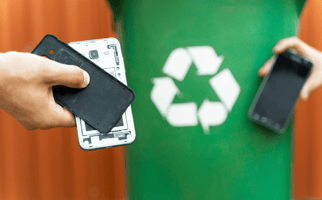As the world commemorates Earth Day, it's crucial to reflect on the environmental impact of...
Understanding R2v3 Certification: What It Is and Why It Matters
In today’s world, where sustainability and security go hand-in-hand, certifications like R2v3 have become essential for businesses managing IT assets and electronic waste. But what exactly is R2v3 certification, and why should it matter to you or your organization? Let’s dive into the details of R2v3 certification, its significance, and how it benefits businesses and the environment alike.
What Is R2v3 Certification?
R2v3 stands for "Responsible Recycling Version 3," the latest standard developed by Sustainable Electronics Recycling International (SERI). It builds upon previous iterations of the R2 standard, which was first introduced in 2008 to promote sustainable and responsible management of used electronics.
The R2v3 certification is a globally recognized framework that establishes best practices for managing IT assets and electronic waste. This includes processes for refurbishing, recycling, and responsibly disposing of electronics. Companies holding this certification demonstrate a commitment to environmental responsibility, data security, and worker safety.
Why is it important?
R2v3 Certification is the latest version of the Responsible Recycling (R2) Standard, a globally recognized certification for electronics recycling and IT asset disposition (ITAD). It sets comprehensive guidelines for the safe, secure, and environmentally responsible management of used electronics. The "v3" refers to the third version of the R2 Standard, which was updated to reflect new industry practices and improve accountability and transparency.
Key Features of R2v3 Certification:
-
Focus on Data Security: Ensures proper handling of sensitive data stored on IT assets, including wiping, degaussing, or physical destruction.
-
Environmental Protection: Mandates responsible recycling practices to minimize environmental harm, with emphasis on reuse and reducing e-waste.
-
Health and Safety: Requires companies to implement rigorous health and safety measures for employees and communities involved in the recycling process.
-
Hierarchy of Reuse: Promotes repair and refurbishment to extend the life of electronics before recycling.
-
Transparency and Traceability: Demands clear documentation and tracking of materials to ensure they are processed responsibly.
-
Quality Assurance: Requires certified facilities to maintain high standards in processing, with regular third-party audits.
R2v3 builds on the previous versions by introducing more stringent requirements, particularly in areas like downstream accountability, risk management, and customer reporting. For organizations involved in IT asset management and recycling, achieving R2v3 Certification demonstrates a strong commitment to environmental stewardship, data protection, and ethical business practices.
Why R2v3 Certification Matters
The importance of R2v3 certification extends beyond compliance; it’s about building a sustainable and secure future. Here’s why it matters:
-
Environmental Responsibility
-
E-waste is one of the fastest-growing waste streams in the world, with millions of tons generated annually. R2v3-certified companies play a vital role in reducing the environmental impact of electronic waste by promoting recycling and reuse.
-
Data Security Assurance
-
Improper disposal of IT assets can lead to data breaches, putting individuals and businesses at risk. R2v3-certified facilities implement industry-leading data destruction methods, providing peace of mind to clients.
-
Regulatory Compliance
-
Many industries, such as healthcare and finance, are bound by strict data protection regulations. Partnering with an R2v3-certified provider helps ensure compliance with laws like HIPAA, GDPR, and CCPA.
-
Enhanced Brand Reputation
Certification signals to customers, partners, and stakeholders that your organization prioritizes sustainability and security. This can enhance brand reputation and set you apart from competitors.
-
Worker and Community Safety
R2v3-certified companies protect their workers and contribute to safer communities by adhering to strict health and safety standards.
Benefits of Partnering with R2v3-Certified Providers
If your organization generates electronic waste or requires IT asset disposition (ITAD) services, partnering with an R2v3-certified provider offers numerous advantages:
-
Unmatched Data Security
R2v3-certified companies follow rigorous data security protocols to ensure all sensitive data is permanently erased or destroyed. They offer:
-
Certified data wiping, degaussing, or physical destruction.
-
Documentation and chain-of-custody tracking for compliance and audits.
This minimizes risks of data breaches and ensures compliance with regulations like GDPR, HIPAA, and CCPA.
-
Environmental Responsibility
R2v3 certification emphasizes reuse before recycling and eco-friendly practices, reducing electronic waste that ends up in landfills. This aligns with corporate sustainability goals and demonstrates environmental stewardship.
-
Compliance with Regulations
R2v3-certified companies adhere to:
-
Environmental laws and regulations (e.g., EPA guidelines).
-
International e-waste handling standards.
-
Industry-specific compliance requirements (e.g., healthcare, finance)
This ensures your organization avoids fines, legal issues, and reputational damage.
-
Sustainability Goals
Align with global sustainability initiatives by reducing your organization’s environmental footprint.
R2v3 certification represents the gold standard for responsible IT asset management and electronic waste recycling. Whether you’re a business seeking ITAD services or an organization aiming to achieve certification, understanding the principles of R2v3 is essential for making informed decisions.
By prioritizing sustainability, data security, and safety, R2v3-certified companies not only protect the environment but also build trust with their clients and communities. In an era where accountability and transparency are paramount, R2v3 certification is more than a badge—it’s a commitment to excellence.


-min.jpg?width=50&name=Todd%20Leach%20(Default%20-%20Output%202)-min.jpg)
